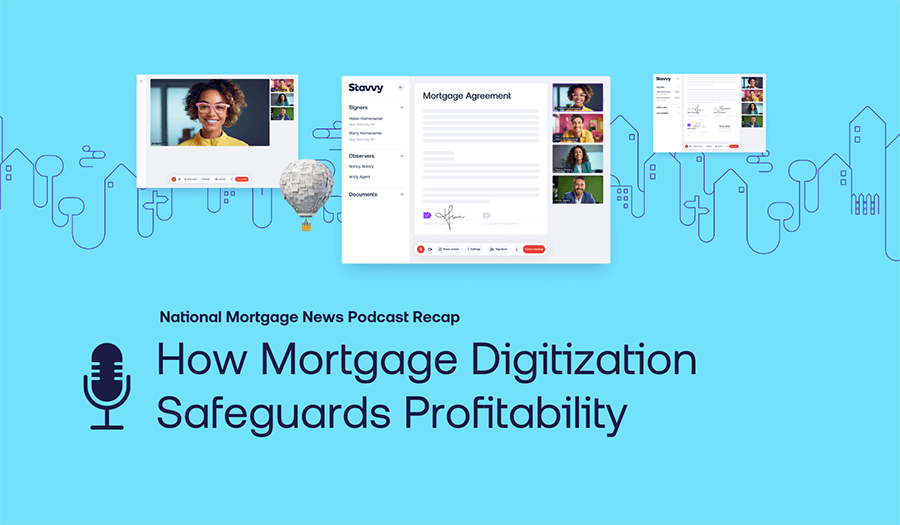It’s easy to double-click on your web browser and type “What is RON?” into your search bar for a basic definition of remote online notarization (RON). It may even read something like this:
RON, also known as remote online notarization, is the electronic notarization of a document. The process often includes using secure audio-video technology, such as Zoom or GoToMeeting, or a digital mortgage platform, like Stavvy.
But without context, you may be left wondering, “Okay, technology aside, how do I know if RON makes sense for me and my title and settlement business?”
“Going RON” is not an entirely new concept in the title and settlement industry. This hot-button topic has been discussed for nearly ten years, gaining significant traction during the height of the COVID-19 pandemic. However, discussed far less frequently is how title and settlement agents can quickly identify if RON is an appropriate business decision.
How to identify if RON is right for your title and settlement business
The first step in determining if RON is right for your business is to confirm that remote online notarization is an approved notarization method in your state.
If it’s not, unfortunately, RON may not be the move right now, but preparing for the day legislation passes is what we believe to be time and resources well-spent.
If RON is legally permissible in your state, ask yourself the following three questions.
Question #1: How do you prepare your closing documents today?
If you work with digital or electronic closing documents, adding eSign and RON services is easy enough to do with the right digital technology partner and platform. However, if you still work heavily with physical paper and don't feel comfortable making the switch anytime soon, eClosing with RON may not make the most sense for you at this time.
Question #2: Where is your homeowner physically located?
Where are your customers located in proximity to you and your preferred notaries? Do in-person closings require you to drive long-distance and reimburse for parking and gas mileage? Do you serve customers in a large or rural geographic location?
If gas, travel, and cost are growing business concerns, you're not alone. Budgets and profit margins can be right at times, and being cost-effective and operationally efficient is best business practice.
Title and settlement companies, big and small, add RON to their mortgage workflow to alleviate some of the financial burdens and risks associated with traditional closings and a traveling workforce.
Physical location and cost aside, consumer preference can also aid in determining the appropriate notarization method for your business and the homeowners you serve. A few questions to consider at this point in the decision-making process include:
- Is the signer local, and are they willing to come to a physical location to meet in person?
- Is the homeowner asking for a digital closing?
Traditional, in-person closings may make the most business sense if the majority of your customers prefer to sign physical paper documents, have availability in their schedule, and is accessible in person. However, many of our title and settlement customers have shared that homeowners often rave about the flexibility and convenience of an eClosing with RON.
Question #3: How and when will the notarial seal be applied to mortgage closing documents?
The next consideration is the notarial seal and, more specifically, how and when it will be applied to the appropriate closing documents.
Will the notarial seal be applied at or around the same time as the signing or at a later time and date? Are you working with a traditional notary with a physical seal stamp or an online or electronic notary with a digital certificate?
If you want to speed up the closing process and have the notary stamp documents at the closing table, RON technology is something you’ll seriously want to consider adding to your closing toolbox. With RON, you can simultaneously apply a digital signature and notarial seal during the closing, saving your business time and resources.
If a physical notarial seal is the only available option, a traditional, in-person closing will work, but it may be worthwhile to consider remote ink-signed notarization (RIN).
RIN is considered a hybrid-digital closing and was widely adopted during the COVID-19 pandemic in states that temporarily allowed it as an alternative to RON. Similar to RON, the notarization process takes place over an audio-video platform. However, unlike RON, the homeowner must physically ink documents while the notary witnesses the wet signature via a live, real-time video. Homeowners must then overnight, fax, or scan and email the ink-signed documents to the notary, so they can complete the ink notarization and provide the documents to the lender and title and settlement agent.
Four common forms of notarization

RON certainly has the spotlight, but as mentioned above, it is not the only way to conduct an efficient digital real estate closing in today’s landscape.
RIN and in-person electronic notarization (IPEN) are considered hybrid closings. Despite not being entirely digital, both notarization and closing methods can provide business efficiencies and streamline your real estate closing process.
Below is a cheat sheet to help you quickly identify the four most common notarization methods, how they differ, and how they are similar.

When it comes to eClosing and RON, stay flexible and curious
As you explore the possibilities of RON, remember to stay open to change. Because of consumer demands, passing remote online notarization legislation, and hard-to-ignore business benefits, RON is becoming common and sticky in the mortgage industry.
If you’re willing to learn as you go—and exercise patience during the digital adoption period—you might be pleasantly surprised to find that RON or some form of hybrid closing will help your business reach new heights.
Learn more about how the  is taking real estate beyond documents.
is taking real estate beyond documents.



![[Webinar Recap] Advancing Your Digital Default Servicing Strategy](https://blog.stavvy.com/hubfs/advancing-your-digital-default-servicing-strategy-blog-recap.png)